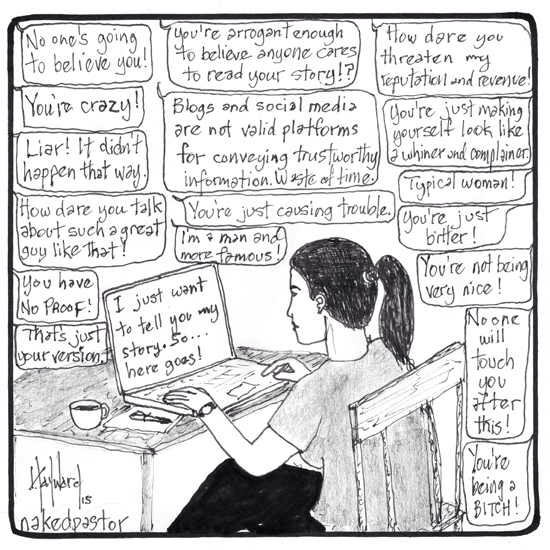Recently, I ran into an acquaintance from a church we attended several years ago. It wasn’t long before she mentioned her current church and then asked about ours. My attempts to be vague were followed by increastingly ardent questions requiring more and more specificity until finally, I found myself giving her the Reader’s Digest version of how we were no longer attending there. And the more I tried to explain, the more zealous her questions became.
“Why didn’t you just march into the pastor’s office and demand answers?”
“Why didn’t you go to the elders and deacons and tell them what was going on?”
“Why didn’t you just leave when they attacked and blamed you rather than dealing with the problem?”
Every answer that I gave was countered with a question that carried a high level of blame.
If only I had marched into the pastor’s office, it would have worked out.
If only I had called on other church leadership, things could have been fixed.
If only I had left at the first sign of trouble, the spiritual abuse would not have been so deep.
And then she said it.
“I wonder what the pastor would tell me about you if I walked in and asked him for his side of the story?”
And suddenly the conversation turned.
I looked at her and said, “Here’s what you should do. Go to the pastor and ask him:
“Why didn’t you just talk to Ellen?”
“Why didn’t you respond to her questions and emails and pleas for help?”
“Why didn’t you tell her personally that she was not to be involved, was not to serve, was not to participate, rather than sending staff people who didn’t know her or have any kind of relationship with her?”
“Why didn’t you tell her specifically what was wrong – what she had done to deserve being ostracized?”
“If she was under discipline, why wasn’t she told?”
“If she was under discipline, why weren’t there formal meetings and appropriate paper work and a plan for reconcilliation and restoration?”
“Why haven’t you apologized for treating her in such a way that she questioned God’s love and acceptance for her?”
“Why haven’t you had everyone who demeaned and diminished her apologize?”
And then I added that she would need to be very careful to continually redirect the pastor back to answering for his handling of the situation. Because I am certain that, rather than answer those questions, he would instead try to point out all of the ways that I had been a nag, a critic, a Jezebel, a trouble-maker. He would try to make me the problem rather than dealing with the problem.
Because the only reason that I am a nag, a critic, a Jezebel, and a trouble-maker is because those questions I told her to ask are the same ones that I asked for over a decade. Those are the same questions that he refused to respond to. Those are the questions that pointed out the problem. And pointing out the problem is what made me the problem.
And I told her that if I were to have the opportunity to speak with him, those are the questions I would ask. The same questions that I have been asking all along.
When I finally fell silent, she looked down at her feet and said, “I would be too afraid to ask those questions.”
And that’s why he and the other church leaders got away with it. Because no one will nail his ass to the wall and demand answers. They are too afraid. Of being labeled a nag. A critic. A Jezebel. A trouble-maker.

